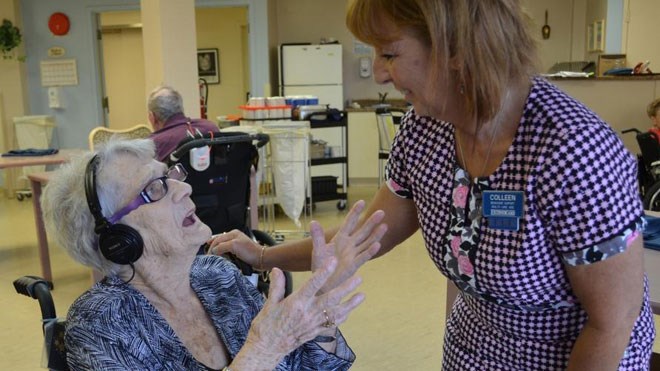It’s 4 p.m., a time when many dementia residents are “sun-downing,” and experiencing an increase in agitated behaviours, including Violet Babcock, a resident of Extendicare York, who is calling for her mother.
Behavioural Support Worker, Colleen Colden, brings Babcock headphones and an iPod with music by one of her favourite singers, Phil Collins. The transformation is instantaneous. Suddenly the senior begins swaying in her wheelchair with a smile on her face. Babcock mentions her mother again. However, her mood has brightened; she’s now telling stories about her mother’s dancing and abilities to predict the future.
“The music helps redirect. It’s amazing to see the difference it makes,” Colden said. “Our brains are hard-wired to connect music with long-term memories … music is the last to leave.”
Colden introduced the Music and Memory program, which began in the United States, to Extendicare York in Sudbury as part of her job caring for residents with dementia, neurological conditions and mental illnesses. Music has been found to engage those who have become detached, lift the spirits of those who are depressed, and calm those who appear agitated.
Even for persons with severe dementia, music can tap deep emotional recall. Recent memories may be compromised, but memory of teenage years is often well preserved.
Benefits of the Music and Memory program have been documented by researchers such as Dr. Oliver Sacks (author of Musicophilia – Tales of Music and the Brain) and Dr. Connie Tomaino. Researchers have found beloved music helps: those who don’t talk much become more verbal, the physically inactive move more, and the depressed appear to brighten.
North East Behavioural Supports Ontario (BSO) is a new system of caring for the most vulnerable seniors, and it also offers help for their caregivers. The North East Local Health Integration Network (North East LHIN) invested last year in 64 new BSO workers, like Colden, in long-term care homes, hospitals, and community agencies across the region. In addition, the LHIN provided training through North East BSO for 5,500 others already working in the field.
After discovering Music and Memory, Colden and other workers at Extendicare York have become certified with the program. They spend time with residents and their families to find music that is meaningful for them. One resident brightens as soon as ‘her’ Bob Marley is played, while another finds comfort listening to masses in Ukrainian, and a third can’t get enough Jimmy Buffet.
Monica Breztlaff, co-ordinator for the North East BSO, said plans are underway to introduce the Music and Memory program to other long-term care homes in the region.
"Music as therapy in dementia care can awaken personal memories, transcend a universal language and deeply connect with the emotional response centre,” said Breztlaff. “It has proven impact on the improvement of behaviour, stimulation of cognitive function and overall quality of life.”
It’s another great tool in the BSO care box. That’s why the North East BSO is appealing to Northerners for donations of new or gently used iPods, MP3 players, chargers, headphones and iTunes gift cards to bring more music to residents in long-term care. Northerners can contribute by calling 1-855-276-6313.
Join Sudbury.com+
- Messages
- Post a Listing
- Your Listings
- Your Profile
- Your Subscriptions
- Your Likes
- Your Business
- Support Local News
- Payment History
Sudbury.com+ members
Already a +member?
Not a +member?
Sign up for a Sudbury.com+ account for instant access to upcoming contests, local offers, auctions and so much more.
